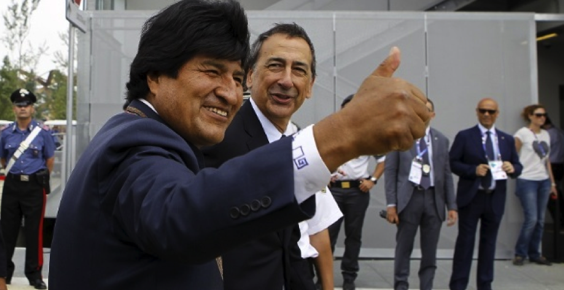
(above) Bolivia Bolivia's President Evo Morales gestures as he arrives to attend the inaugural session of "Italy-Latin America and Caribbean" conference in Milan, Italy June 12, 2015. | Photo: Reuters
New Bolivian Law Forces Investor Disputes to Be Settled Locally
June 12, 2015 - telexurtv.net
The move builds on Bolivia's 2007 decision to withdraw from the International Centre for Settlement of Investment Disputes.
In the presence of business leaders from the country's private sector Bolivian President Evo Morales signed into law on Thursday a new piece of legislation that will require investment disputes to be arbitrated in Bolivian courts.
By insisting that investment disputes are dealt with locally, rather than in the international arena, the move builds on Bolivia's 2007 decision to withdraw from the International Centre for Settlement of Investment Disputes.
The move also contrasts with controversial measures written into free trade deals, such as the proposed investor-state dispute settlement mechanism within the Trans-Pacific Partnership and Transatlantic Trade and Investment Partnership, which grant transnational corporations power to sue individual nations.
"This conflict dispute measure will take into consideration both sides and will only involve the court as a measure of last resort," according to a statement issued by the Bolivian attorney general office.
"The law is based on flexibility and morality so that the involved parties can resolve their conflict, and so that all interests are guaranteed," the attorney general statement added
During Thursday's signing of the new arbitration law, President Morales emphasized the importance of the new legislation as tool for helping to attract foreign investment to aid economic growth.
"The government did not impose the New Investment law, nor the new Arbitration law, these measures were introduced by consensus, which will allow us to continue growing economically," Morales stated.
Despite withdrawing from the ICSID, foreign investment in Bolivia has picked up in recent years, especially in the country's energy sector, particularly attracting Chinese and European investment.
Under the Bolivian constitution, the government can expropriate property for the public good or when it does not fulfil a "social purpose."